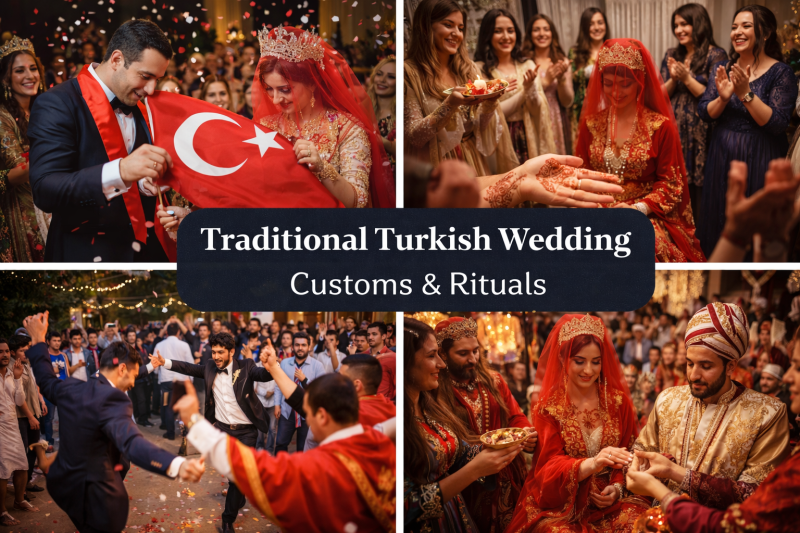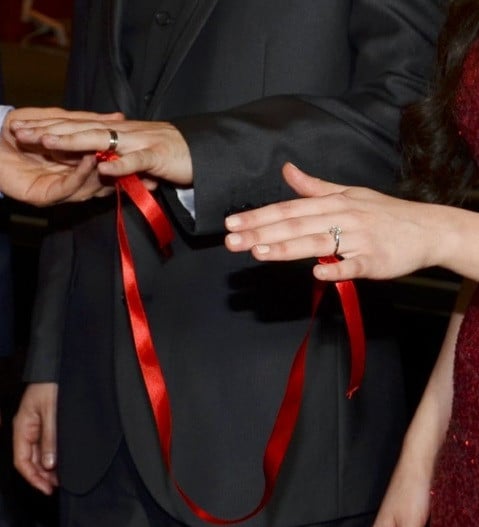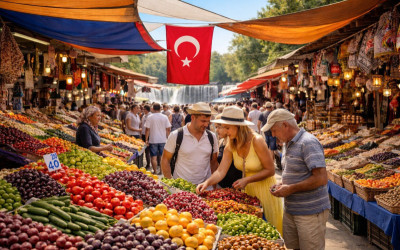Marriage in Turkish Culture: Traditions, Process, Family Life, and Divorce Rates
Marriage holds great significance in Turkish culture and has been shaped by centuries-old traditions. In Turkey, the process of getting married involves multiple steps, from meeting a partner to the wedding ceremony, incorporating both modern and traditional elements. Additionally, factors such as the average marriage age, number of children, reasons for divorce, and divorce rates play a crucial role in understanding Turkish marriage culture. Here is a comprehensive look at marriage in Turkey.
1. Meeting a Partner and First Steps
Traditional Arranged Introductions
In the past, marriages in Turkey were often arranged by families. Parents would search for a suitable spouse for their child, and the families would meet to discuss the possibility of marriage. This tradition still exists in rural areas.
Before the formal marriage proposal, families typically:
- Conduct background checks on the potential spouse.
- Evaluate character compatibility and family reputation.
- Arrange an initial family meeting, where the couple may or may not know each other beforehand.
Modern Ways of Meeting
In urban areas and among younger generations, marriages today are mostly based on personal choice. Couples meet:
- At university or work,
- Through mutual friends,
- Via social media or dating apps.
Once a couple decides to marry, they inform their families and follow traditional customs for an official engagement.
2. Marriage Proposal and Engagement (Söz Kesme)
Marriage Proposal (Kız İsteme Ceremony)
If the couple agrees to marry, the first official step is the kız isteme (asking for the bride’s hand) ceremony. The groom's family visits the bride’s home to formally ask for permission.
- The eldest male in the groom’s family requests the bride’s hand in marriage with the traditional phrase: "With God's command and the Prophet's approval, we ask for your daughter’s hand in marriage."
- The bride’s family may accept immediately or delay the decision to ensure both families agree.
- In some cases, multiple visits are necessary before approval is granted.
Salted Coffee Tradition
During this visit, the bride serves Turkish coffee, sometimes with salt instead of sugar as a playful test. If the groom drinks it without complaint, he is seen as patient and respectful.
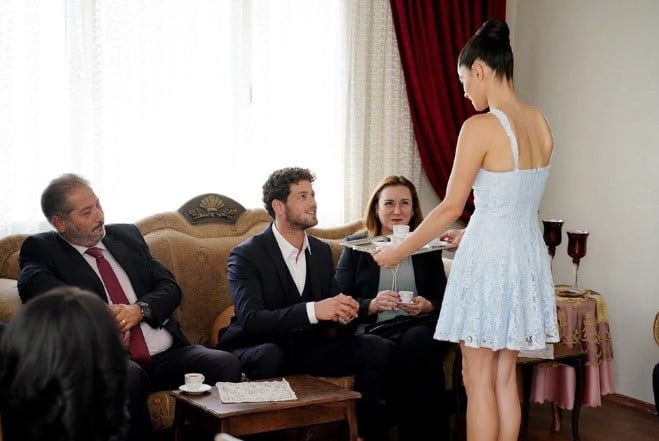
Engagement Ceremony (Söz Kesme - Cutting the Ribbon)
Once both families agree, a small ceremony takes place where engagement rings are tied together with a red ribbon.
- A family elder cuts the ribbon, symbolizing the couple’s official engagement.
- This is followed by a celebration with close family and friends.
3. Engagement and Wedding Preparations
The engagement ceremony (nişan) is an important step before marriage and can vary in size.
- Small Engagement (Family-Only): A private event with only close family members.
- Large Engagement (Venue Ceremony): A grander event held at a hall or an outdoor setting with extended relatives and friends.
Engagement Traditions
- The couple exchanges engagement rings.
- The bride wears a special engagement dress, while the groom wears a suit.
- Families exchange gifts such as jewelry and traditional dowry items.
In some regions, engagement ceremonies also include a gift-giving tradition, where gold coins or bracelets are presented to the couple.
4. Average Marriage Age and Number of Children
Average Age of Marriage in Turkey
The average age for marriage in Turkey has increased over the years:
- In rural areas, women typically marry between 20-24 years old, and men between 25-29 years old.
- In urban areas, the average age is slightly higher, with women marrying between 25-30 years old, and men between 28-33 years old.
Number of Children in Turkish Families
- The average number of children per family in Turkey is between 1.8 and 2.
- In the past, families had three to four children, but in modern times, one or two children is more common due to economic and lifestyle changes.
- In rural areas, larger families are still more common, while in cities, the nuclear family model is more prevalent.
5. Wedding Preparations and Traditions
Bridal Dowry (Çeyiz Preparation)
The bride's family prepares a dowry (çeyiz), which includes:
- Bedding sets,
- Kitchenware,
- Embroidered tablecloths and handmade lacework.
In some regions, the dowry is displayed publicly before the wedding for relatives and neighbors to admire.
6. Henna Night (Kına Gecesi) and Wedding Ceremony
Henna Night (Kına Gecesi - Bridal Night)
The night before the wedding, a traditional henna night is held, primarily for women.
- The bride’s hands are decorated with henna.
- Traditional folk songs are sung, especially emotional ones like "Yüksek Yüksek Tepelere" to make the bride cry as a farewell to her family.
- The bride wears a red veil and traditional clothing.
In some cases, the groom also attends, and henna is applied to his hand.
During the Bosphorus dinner cruise in Istanbul, the folklore team performs a traditional Henna Night ceremony. Learn more: Bosphorus Dinner Cruise.
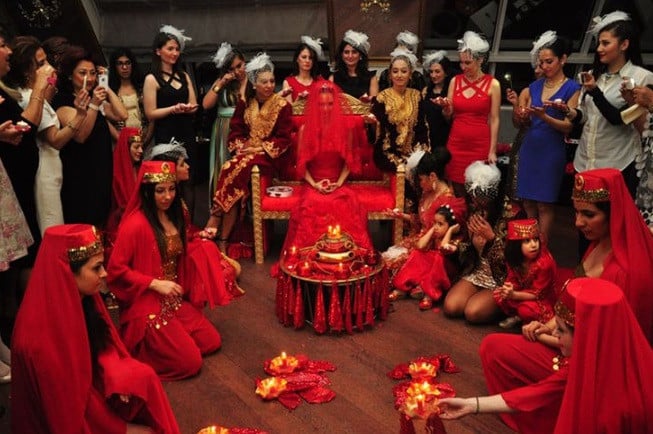
Wedding Ceremony
Weddings in Turkey can vary depending on the region and family preferences.
Traditional Weddings
- Village weddings last for three days and three nights.
- Live music with drums and zurna (a traditional instrument) is common.
- Gold and money gifts are given to the couple.
- The bride is taken from her family home in a ceremonial procession.
Modern Weddings
- Many prefer hotel, ballroom, or garden weddings.
- Celebrations include music, dancing, and photography.
7. Life After Marriage and Family Dynamics
After marriage, couples establish their own households, but family ties remain strong.
- Visiting parents during holidays is a must.
- In traditional families, the mother-in-law may live with the couple, though modern families prefer separate homes.
- In some regions, elders influence the naming of children after their birth.
8. Divorce Reasons and Rates in Turkey
Common Reasons for Divorce
The most common reasons for divorce in Turkey include:
- Incompatibility and Relationship Conflicts – Many divorces occur due to personality clashes.
- Financial Problems – Economic struggles can create tension between partners.
- Infidelity – Cheating is a significant cause of divorce.
- Family Pressure and In-Law Conflicts – Overbearing in-laws can contribute to marital issues.
- Domestic Violence and Abuse – Physical and emotional abuse is a serious reason for divorce.
Divorce Rate in Turkey
- The annual divorce rate in Turkey is approximately 25-30%.
- In recent years, the divorce rate has increased, especially in big cities.
- 80% of divorces occur within the first five years of marriage.
Marriage Between Turks and Foreigners: Cultural, Social, and Statistical Insights
Marriage plays a fundamental role in Turkish society, shaped by cultural values, traditions, and social norms. With globalization, marriages between Turks and foreigners have become increasingly common. According to data from the Turkish Statistical Institute (TÜİK), approximately 4.1% of all marriages in Turkey in 2022 involved a foreign spouse.
Turkish Women and Marriages with Foreigners
The rate of Turkish women marrying foreigners has been rising, particularly in major cities and among those living abroad. In 2022, 1.5% of marriages in Turkey involved Turkish women marrying foreign men. The most common nationalities of foreign husbands include Germany, Syria, Azerbaijan, Austria, and the United Kingdom. Many Turkish women, due to career and education opportunities, relocate abroad or work in international environments, increasing their chances of meeting people from different cultural backgrounds.
Turkish Men and Marriages with Foreigners
Turkish men also frequently marry foreign women, particularly in tourist regions and among those working or living abroad. According to TÜİK, 6.3% of Turkish men’s marriages in 2022 were with foreign women. The most common nationalities of foreign wives include Russia, Azerbaijan, Ukraine, Uzbekistan, and Iran. Many Turkish men, especially those in the tourism or business sectors, tend to marry women from Eastern Europe, Russia, Central Asia, and Arab countries. However, language barriers, cultural differences, and varying perspectives on family life can present challenges.
Challenges and Advantages of International Marriages
Marrying a foreigner can offer a unique experience, but it also comes with challenges:
- Language and Communication: Effective communication can be difficult for couples who do not share the same native language. Research shows that 18% of international marriages face difficulties due to language barriers.
- Cultural Adaptation: Differences in family values, parenting styles, and daily habits can lead to disagreements. About 25% of Turkish spouses in international marriages report cultural differences as a significant factor in their relationships.
- Social Perception: In more traditional communities, international marriages can attract attention and mixed reactions. In rural areas, 30% of international marriages experience family approval challenges.
On the positive side, cultural diversity and different perspectives allow couples to learn from each other and develop a broader worldview. Studies indicate that 72% of couples in international marriages believe that cultural diversity has enriched their relationship.
Although marriages between Turks and foreigners have become more common, cultural and social factors still play a significant role in shaping these relationships. 60% of international marriages in Turkey take place in major cities, where exposure to different cultures is higher.
Marrying a foreigner requires cultural adaptation, but it also brings an enriching experience by combining different traditions and lifestyles. Research shows that 80% of international marriages successfully sustain their first five years, though language and cultural adjustment remain critical factors for long-term success.
Marriage Traditions in Turkey: 100 Years Ago and Today
100 years ago, marriages in Turkey were arranged by families in 80–90% of cases; women married between the ages of 18–20 and men between 23–25.
Today, marriage is based on individual preferences and love. According to TÜİK, the average marriage age is 26 for women and 28 for men.
Modern marriage rates have declined by 30–40% compared to traditional family-oriented marriages.
Economic, educational, and social factors play a decisive role in the modernization of the marriage concept in Turkey.
Conclusion: The Significance of Marriage in Turkish Culture
Marriage in Turkey is more than just a union between two people—it is also the merging of two families. Traditions vary by region, but marriage is always built on family support, social values, and cultural heritage.
Today, Turkish weddings blend traditional and modern elements, reflecting the changing social landscape. However, family bonds, love, and respect remain the core pillars of Turkish marriage culture.
If you have any questions, feel free to reach out to us through our contact page: Vigo Tours Contact.
